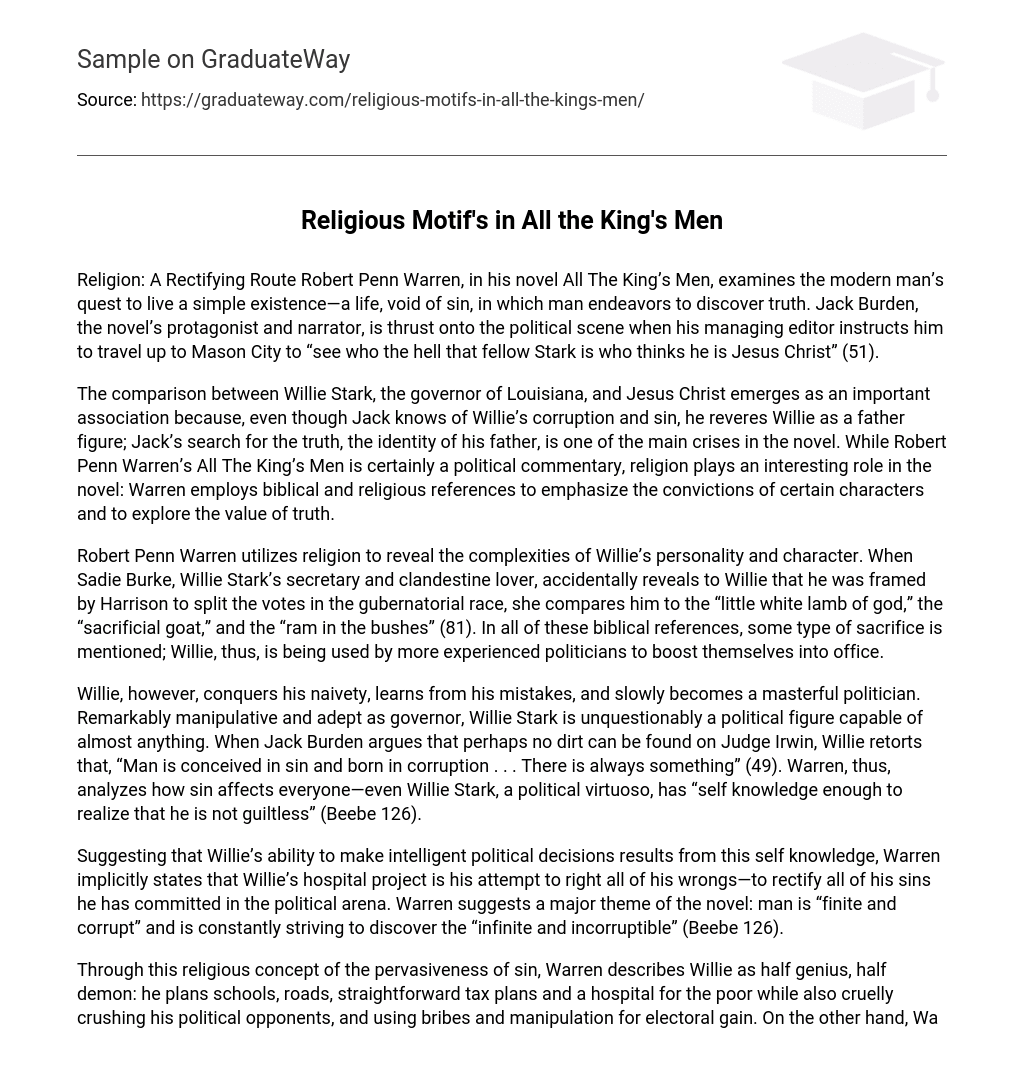Religion: A Rectifying Route Robert Penn Warren, in his novel All The King’s Men, examines the modern man’s quest to live a simple existence—a life, void of sin, in which man endeavors to discover truth. Jack Burden, the novel’s protagonist and narrator, is thrust onto the political scene when his managing editor instructs him to travel up to Mason City to “see who the hell that fellow Stark is who thinks he is Jesus Christ” (51).
The comparison between Willie Stark, the governor of Louisiana, and Jesus Christ emerges as an important association because, even though Jack knows of Willie’s corruption and sin, he reveres Willie as a father figure; Jack’s search for the truth, the identity of his father, is one of the main crises in the novel. While Robert Penn Warren’s All The King’s Men is certainly a political commentary, religion plays an interesting role in the novel: Warren employs biblical and religious references to emphasize the convictions of certain characters and to explore the value of truth.
Robert Penn Warren utilizes religion to reveal the complexities of Willie’s personality and character. When Sadie Burke, Willie Stark’s secretary and clandestine lover, accidentally reveals to Willie that he was framed by Harrison to split the votes in the gubernatorial race, she compares him to the “little white lamb of god,” the “sacrificial goat,” and the “ram in the bushes” (81). In all of these biblical references, some type of sacrifice is mentioned; Willie, thus, is being used by more experienced politicians to boost themselves into office.
Willie, however, conquers his naivety, learns from his mistakes, and slowly becomes a masterful politician. Remarkably manipulative and adept as governor, Willie Stark is unquestionably a political figure capable of almost anything. When Jack Burden argues that perhaps no dirt can be found on Judge Irwin, Willie retorts that, “Man is conceived in sin and born in corruption . . . There is always something” (49). Warren, thus, analyzes how sin affects everyone—even Willie Stark, a political virtuoso, has “self knowledge enough to realize that he is not guiltless” (Beebe 126).
Suggesting that Willie’s ability to make intelligent political decisions results from this self knowledge, Warren implicitly states that Willie’s hospital project is his attempt to right all of his wrongs—to rectify all of his sins he has committed in the political arena. Warren suggests a major theme of the novel: man is “finite and corrupt” and is constantly striving to discover the “infinite and incorruptible” (Beebe 126).
Through this religious concept of the pervasiveness of sin, Warren describes Willie as half genius, half demon: he plans schools, roads, straightforward tax plans and a hospital for the poor while also cruelly crushing his political opponents, and using bribes and manipulation for electoral gain. On the other hand, Warren uses religion to challenge Jack Burden on his ultimate quest for truth. When Adam Stanton explains how a person would be different if they survived a lobectomy, Jack wonders: “Like after you get converted and baptized? (316). Jack’s mindset, clearly technical and systematic, shows he is merely regurgitating fact. Jack’s mention of religious ceremony and tradition shows his simple and “scientific” perception of truth. Furthermore, Jack’s desire to attach truth to simple recitation of fact is complicated when he recognizes a different kind of truth in Willie. Jack, after having done months of research to collect dirt for Willie, reveals to Judge Irwin that he knows of the Judge’s indiscretions.
Ironically, Jack discusses the ugly side of truth with Judge Irwin—saying that there is “blackness in truth” (343). The suicide of Judge Irwin, coupled with the chaos that the Irwin scandal causes, forces Jack to confront truth—realizing one’s identity and acting upon it. Tis religious undertone comes from Psalm 51:6—“Thou desirest truth in the inward parts”—further extrapolates that truth must be discovered within the being, rather than from external sources (Beebe 126). Robert Penn Warren creates characters that are inescapably sinful and immoral.
Judge Irwin, for example, is a hypocrite; Sadie Burke is constantly jealous; Tiny Duffy is consumed with greed. Warren explores how the pervasiveness of this sin affects each character. He uses biblical references to demonstrate how complex Jack Burden’s quest for truth is. He employs religion as a lense to view the political gambits of Willie Stark. The religious motifs of All The King’s Men constrict the focus of certain characters and allow Warren to probe into the ideas of sin and truth. Word Count: 742





